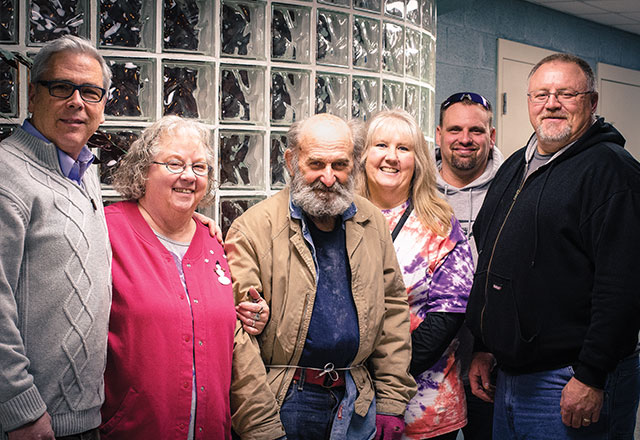On the first Monday in February, Richard, age 69, turned a page. He left Nashville Rescue Mission after a 524-day stay, and headed to Indiana to live with family—meeting many of them for the first time.
Walking out arm-in-arm with his sister, it was obvious Richard felt a joy long missing in his life—the blessing of family.
“About a year ago, Fred Hoffman, a Mission case manager, suggested we make a list of our most challenging cases and focus on what we could do to improve their quality of life,” said Mike Tatar, lead case manager. “We started case management for guests three years ago, so it’s still new for us. And while we provide this service to everyone, there are many who do not want help or are lost in the fog of mental illness and unable to ask for help. Richard was at the top of our list.”
“The day Richard reconnected with his family was only possible because a dedicated group of people made a concerted effort to help someone, many might consider unreachable,” said Mark Templeton, supervisor of Mental Health Cooperative’s (MHC) PATH (Project for Assistance in Transitioning from Homelessness) program. “I’m grateful Nashville Rescue Mission exists. I appreciate the collaboration between our staff and the Mission. It’s because of this relationship, Richard, and others like him, are able to get the help they need to win the battle over mental illness. Our goal is to increase a person’s quality of life. Richard’s quality of life definitely improved and it’s worth celebrating.”
“I was shocked when I got the call from the Mission telling me Richard was there,” said his sister Patti. “We thought he was dead. I hadn’t seen him in 34 years and the last time we spoke was in 1988. I can’t wait to take him home and introduce him to his new great grandchild.”
“The key to helping someone like Richard is in case management and understanding the connection between homelessness, addiction, and mental illness,” said Glenn Cranfield, president and CEO of the Mission. “It’s important we educate the community about these links so we can provide much-needed services without stigma or judgment. By providing MHC with office space and hours at the Mission, our case managers can refer homeless guests experiencing mental health issues to MHC’s PATH program, where they receive comprehensive treatment for their psychosocial and psychiatric needs. This relationship made it possible for Richard to get the help he needed.”
“While Richard battled alcohol early in his life, over time, mental illness debilitated him,” said Rob Frazier, case manager at the Mission. “It took months of Fred saying hello to him before Richard felt comfortable talking with a doctor from MHC.”
After a couple of months on the right medications, Richard recalled names and telephone numbers. A few phone calls later, Richard’s family made plans to take him home.
“What a blessing to see this family reunited after many years apart,” said Frazier, as he watched Richard drive away with his family. “I’m also thankful Fred could see the fruits of his labor before retiring after 25 years of serving the homeless.”

So how does someone like Richard end up homeless and living at Nashville Rescue Mission?
“If someone has an untreated mental illness things can spiral out of control,” said Tatar. “Without nutritious meals, their medication may not work, or because they are homeless and unstable, they struggle with taking it or they can’t afford it. It’s a vicious cycle we see within the homeless community.”
“There are many faces to homelessness, addiction, and mental illness,” said Tatar. “Connecting them with the services they need and developing an individual treatment plan plays a major role in getting them the help they need. But it only works if that person wants help. Unfortunately, not everyone does.”
“How can you go to treatment without the stability of a place to eat and sleep?” asks Cranfield. “A person needs to feel safe and be willing to trust those who are trying to help. The Mission provided Richard with a safe place to sleep and nutritious meals to eat. With patience and persistence, we reached Richard. It took time, but it’s worth it to see this man reconnect with his family after many years.”
May is Mental Health Month. Unfortunately, more than 1/5th of the 610,000 homeless people across the USA suffer from a severe mental illness, according to the US Department of Housing and Urban Development. They’re gripped by schizophrenia, bipolar disorder, or severe depression—all manageable with the right medication and counseling.
“Left untreated, mental illness can rob people of decades of health and life,” said Cranfield. “These losses are tragic because there is evidence that early intervention can prevent mentally ill people from deteriorating, halting what once seemed like an inevitable decline. And in the eyes of God, every single person matters. Regardless of their situation, circumstance, diagnosis, or addiction. God loves them and that’s what we are all about—showing each person who is hurting, hungry, homeless, or lost, God loves them and no one is too far gone to be beyond His reach. There is hope.”




